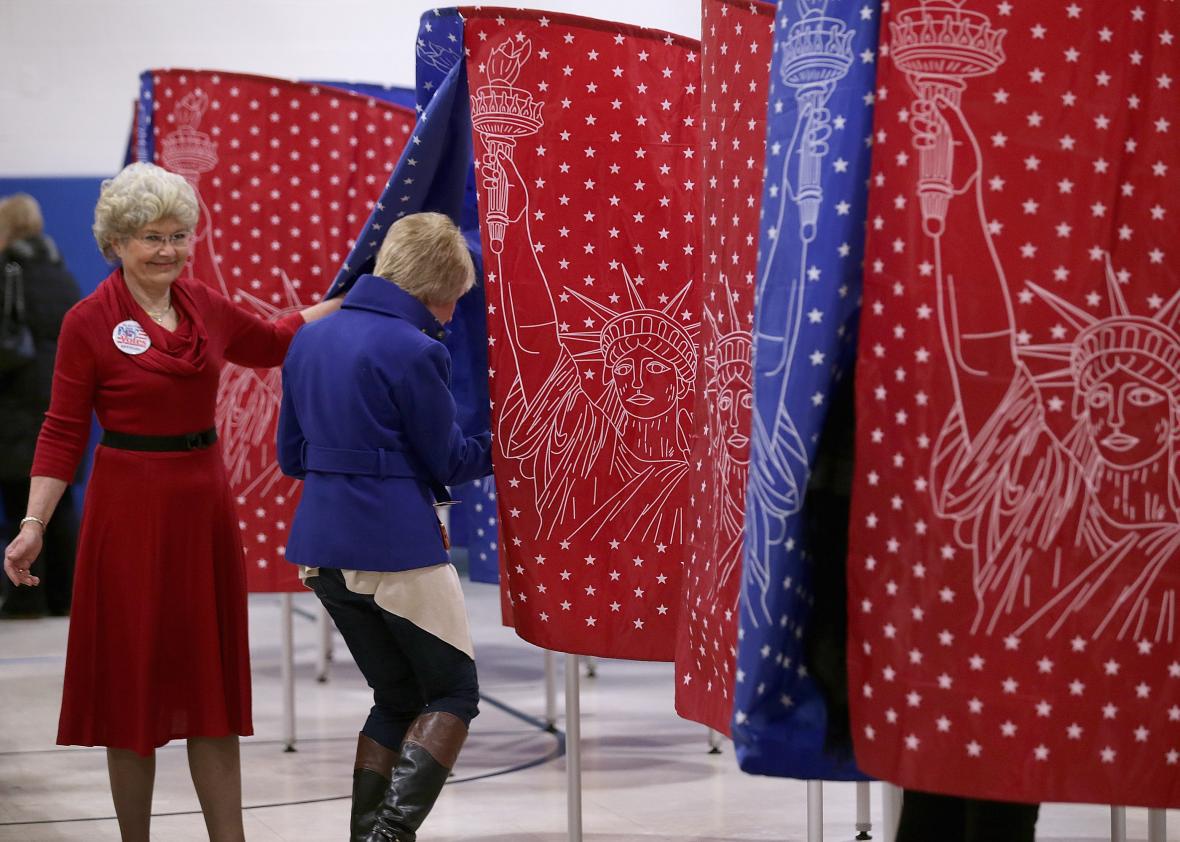Every Election Day, I march down to my polling place eager to vote for the candidates and issues near and dear to my heart. Eleanor Holmes Norton? Yes, please! D.C. statehood? Hell yeah! Legal marijuana? Duh! But as I move down the ballot, I realize there are other local races I know nothing about. In a fit of panic, I whip out my smartphone and Google up a storm, searching candidate websites and Washington Post endorsements to figure out who deserves my vote in bunch of races I will promptly forget about.
Last-minute ballot research might not be ideal, but it’s better than casting a vote in the dark. It’s also superior to sitting out a race: A friend of mine recently panicked in the ballot booth, uncertain of who to support for the board of education; she considered voting for nobody, but two minutes of smartphone research persuaded her to vote against a Koch-aligned Trump supporter. Probably a good call!
Several states, however, ban the use of electronic devices in voting booths altogether, arguing that they can be tools of voter fraud or coercion. Like ballot selfie bans, these laws are well-intentioned but terrible for democracy. Voters deserve access to information, especially at the ballot box, without fearing that their research could be criminal.
As important as voting may be, most races are strange and obscure. That doesn’t make them unimportant, but it does make them confusing and surprising. For instance, in Washington, D.C., Advisory Neighborhood Commissions decide the fate of neighborhood life, exercising zoning powers that will determine whether my neighbor is coffee shop or a strip club. In theory, Advisory Neighborhood Commissioners are very important; in reality, I have no idea who they are. And in all likelihood, I will not be motivated to Google them until I am in the ballot box, mercilessly confronted with my own ignorance. At that point, I will finally research my ANC election and make a rational decision.
You may say I’m simply lazy and don’t deserve to vote in an election I don’t understand before entering the voting booth. And you may be right! But consider California voters, who, this year, are asked to weigh in on 17 different ballot initiatives, ranging from straightforward to mind-bending. Some of these initiatives ask an easy question—would you like to legalize marijuana? (Please say yes, California!) Would you like to end the death penalty? (Ditto!) But some of them are downright bizarre. Proposition 66, for instance, might look like a means of limiting capital punishment upon first glance, but is actually designed to speed up executions. And Proposition 52 is a befuddling word salad. Here’s the information California gives voters on the ballot to help them decide how to vote on Prop 52:
Extends indefinitely an existing statute that imposes fees on hospitals to fund Medi-Cal health care services, care for uninsured patients, and children’s health coverage. Fiscal Impact: Uncertain fiscal effect, ranging from relatively little impact to annual state General Fund savings of around $1 billion and increased funding for public hospitals in the low hundreds of millions of dollars annually.
What the hell does that mean? What would it actually do? It’s pretty hard to parse without the help of Google. And unless you have an unusual amount of free time, patience, and foresight, you’d probably rely on your smartphone to walk you through this and 16 other propositions.
Luckily, California allows cellphones in the ballot booth and will soon even explicitly permit ballot selfies. Moreover, the state is attempting to modernize the voting process; Los Angeles County is currently overhauling voting—by, for instance, allowing people to fill out a sample ballot beforehand, create a QR code, then scan that code in the booth to automatically fill in their ballot. These reforms likely represent the future of voting, and they involve more technology and transparency, not less.
But voters in Delaware, Iowa, Maryland, Tennessee, Texas, and West Virginia are not so lucky: They are all prohibited from using their smartphones in the voting booth. A Maryland voter perplexed by a strange ballot measure about filling vacancies for state and federal offices is barred from Google. A voter in Texas bewildered by an array of local and statewide judicial elections can’t search the nominees’ positions. Voting booth technology bans limit the amount of information a voter has when making her selection, making her more likely to choose blindly or sit out a race. The injury these laws inflict on our democratic system vastly outweigh the theoretical benefits they might provide.
And what benefits are those, exactly? A voter intent on using his phone to engage in fraud can easily do so covertly once safely ensconced in the ballot booth. Legislators truly terrified of this problem could easily pass a law criminalizing the use of technology at the polls for fraudulent purposes—although most existing voter fraud laws are broad enough to sweep in this conduct. Ultimately, the smartphone bans just don’t make any sense. It’s time to embrace the role that technology can play in helping voters to make informed decisions. Let the people Google.
